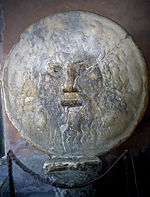Truth: Difference between revisions
Jump to navigation
Jump to search

imported>Derek Hodges (added image) |
imported>Hayford Peirce (Don't see why "The topic of" is needed in first sentence -- seems overly wordy to me; also, think "philosophers" are meant, not "philosophy", otherwise, who is "they" further on?) |
||
| Line 2: | Line 2: | ||
[[Image:Bocca-della-Verita.jpg|thumb|150px|The ''Boca della Verita'' or ''Face of Truth'' in Rome. Photo by Jerzy Strzelecki]] | [[Image:Bocca-della-Verita.jpg|thumb|150px|The ''Boca della Verita'' or ''Face of Truth'' in Rome. Photo by Jerzy Strzelecki]] | ||
'''Truth''' is spoken about in two ways: either as deep, important [[wisdom]], or as a certain desirable quality of any [[statement]], no matter how trivial. [[theology|Religious thinkers]] sometimes speak of ''the Truth''—with a capital "T"—as meaning an entire [[worldview]], or of some deeply important insight, or even as [[God]] himself.<ref>The [[Bible]] verse John 14:6 has [[Jesus]] say, famously, "I am the way, the truth, and the life. No one comes to the Father except through me."</ref> By contrast, for contemporary [[philosophy|philosophers]], the topic of truth is a rather abstract, [[technical philosophy|technical]] one in the [[philosophy of language]]: they study what we mean whenever we say that any casual claim, such as the claim that I just arrived home, is ''true.'' For discussion of deep Truth, we recommend that you consult the articles [[religion]], [[wisdom]], [[enlightenment]], [[God]], and [[worldview]]. The following article concerns the abstract, technical topic. | |||
== Notes == | == Notes == | ||
<references/> | <references/> | ||
Revision as of 21:16, 7 May 2008
Truth is spoken about in two ways: either as deep, important wisdom, or as a certain desirable quality of any statement, no matter how trivial. Religious thinkers sometimes speak of the Truth—with a capital "T"—as meaning an entire worldview, or of some deeply important insight, or even as God himself.[1] By contrast, for contemporary philosophers, the topic of truth is a rather abstract, technical one in the philosophy of language: they study what we mean whenever we say that any casual claim, such as the claim that I just arrived home, is true. For discussion of deep Truth, we recommend that you consult the articles religion, wisdom, enlightenment, God, and worldview. The following article concerns the abstract, technical topic.
